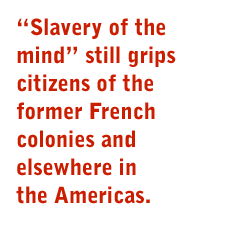


by Kathleen Cason
Intro
| Revolution and Abolition
| Widening the Canon
| Found in Translation


Found in Translation
As Kadish studied works of lesser-known women authors, she discovered that their views were quite different from those of men. For example, instead of focusing on the violence of the Haitian revolt, women took the view that the brutality of slavery drove the slaves to act as they did. It was, she said, a quite modern view.
Sophie Doin, a wealthy 19th-century French Protestant and abolitionist, wrote widely about the downtrodden — the poor, women, prisoners, slaves and others. Kadish republished four of Doin’s forgotten works, along with an introductory analysis, in a volume that includes the novel La Famille Noire (The Black Family) and three short stories.
Doin’s stories featured interracial relationships and the Haitian revolution. Her black characters risked their lives to save whites who they cared about. Through literature, Doin not only presented this revolution in a positive light — as a symbol of freedom for people of all races and genders — but more importantly she humanized slaves.
“Doin was an abolitionist at a moment in history where her writings could have had a real influence on the public,” Kadish wrote in the introduction. “It would be a mistake not to recognize the significance of Sophie Doin as a minor author.”
Charlotte Dard, another little-known writer, was a survivor of the doomed frigate Medusa. She wrote an account of the sinking and her family’s experiences as colonists in Senegal in the book La Chaumière Africaine (The African Hut), published in 1825. A new edition with an introduction by Kadish was published in April 2005.
Dard provided a unique viewpoint both as a woman and as a middle-class colonist. Her book described the relationships among the various peoples she encountered: French, English, Moors and blacks. African people were portrayed as compassionate, generous, humane, and intelligent; the Moors, however, were depicted negatively as cruel traders in human flesh.
The life and writings of yet another overlooked author, the Marquise de la Tour du Pin (1770-1853), are coming to light through efforts of Kadish’s doctoral student Lisa Van Zwoll. The Marquise had friends in high places and was well connected to the literary world, Van Zwoll said. Her memoir, Journal of a 50-Year-Old Woman, was filled with anecdotes about famous people she knew, such as Marie Antoinette, Napoleon and many other political players. She also described her escape from The Terror — the backlash against the aristocracy that claimed many lives following the Revolution. During that time, she spent four years in Albany, N.Y., where she had a farm and slaves, whom she later freed.
Kadish said that these women’s writings should be judged by new criteria. Though not deemed high literature, they have helped resolve mysteries of seemingly contradictory views. For example, Kadish had been puzzled by the alignment of abolitionists in the 1820s both with monarchists and colonialism. Dard’s book helped provide an explanation: the abolitionists viewed colonization as a remedy for slavery.
When France lost Haiti, it lost much of the economic advantage of the Americas; and so France turned toward Africa. Abolitionists believed that France’s colonization of Africa would be beneficial to both peoples: The French would reap economic advantages and the Africans, who would be paid for their labor, would benefit as well. It wasn’t until the 1880s that those who supported abolitionism began to question colonialism.
Colonialism, even where long gone, still contributes to many modern-day problems around the world, and the residual effects of slavery — “slavery of the mind,” as Condé has called it — still grips citizens of the former French colonies and elsewhere in the Americas. By Kadish’s republishing and analyzing works by little-known authors, texts once lost are being rediscovered — and are providing new insights into historical and contemporary events. Kadish and her collaborators also are translating stories and books previously available only in French to widen access to these treasures by researchers and readers, and many such texts can be accessed from her Web site.
“Doris is one of the few scholars interested in the francophone world apart from the literature,” Condé said. “Many write about the literature, but few are interested in history or even the sociology. It seems to me Doris is the only one to pay attention to what has been called the ‘so small.’”
That attention is producing a steady stream of works likely to continue well into the future. Her new essay on Sophie Doin’s portrayal of the Haitian Revolution is slated to appear in the June 2005 issue of Yale French Studies; and a monograph, Against French Slavery: 1816-1830, will be completed within the year.
“People need to know that during the horrible phase of slavery there were individuals who fought against it, many devoting their lives to that fight,” Kadish said. “I have a treasure trove — boxes and boxes of relevant materials — that need to be made available either online or in other ways.”
For more information, contact Doris Kadish at dkadish@uga.edu or visit her Web site at www.uga.edu/slavery
Kathleen Cason is associate director of the Research Communications Office and associate editor of UGA Research Magazine.
Intro
| Revolution and Abolition
| Widening the Canon
| Found in Translation
For comments or for information please e-mail the editor: jbp@ovpr.uga.edu
To contact the webmaster please email: ovprweb@uga.edu
![]()